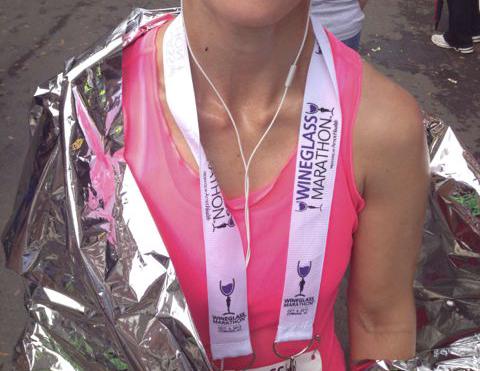 Time to Read: ~4 min
Time to Read: ~4 minFor 2012, the annual challenge that Scott and I chose was the Rochester Marathon! We'd completed the Rochester Half and participated in the relay. Naturally, the next step was to complete the full. I've since completed the Wineglass Marathon (2013) and the Philadelphia Marathon (2013).
Recently a friend asked about training plans for her first marathon. I decided it would be a great idea to type up some information to help other people, and for me to keep all my training notes in one place. Here are some plans that I've used/modified for my races.
Hal Hidgon
I chose the Hal Hidgon Novice 2 Marathon Plan for my first marathon. I pretty much followed it as written, adding in the non running things that I enjoy as well. I typically try to get a couple of weight lifting sessions in per week as well as some cycling, Pilates and Yoga, so I put those into the week where they fit. I think this plan is perfect for you if you have the following goals/physical stamina:
- You have a nice running base, and typically run 15-25 miles per week.
- You occasionally/regularly compete in races.
- You enjoy running 4 times per week.
- You feel ready for some pace work.
- You are a social runner. Most of the workouts do not call for specific paces.
- Your goal is to finish the marathon strong and run comfortably.
Run Less, Run Faster
For my 2nd marathon I was ready for a little more challenge. Now that I had one successful marathon under my belt, my goal was to PR. My real, unshared desire was to BQ. While visiting my sister in Oregon during the summer of 2012, I saw this book on her shelf. Not yet having run my first marathon, I was already thinking about number 2 and I picked it up and read it from cover to cover on the way home on the airplane. There are great pace calculators in the book. I happened to look at the Marathon calculators 2 days before the 2012 Rochester Marathon. The pace predictor for me based on my HM time was a sub 4 full marathon. Until reading that, my only intention had been to finish strong. Knowing my predicted finish based on actual racing, helped me to push my own expectations. I ended up with a 3:58:30 for the run, though I made a lot of novice mistakes (going out too fast, not fueling enough etc).
For the Wineglass the following fall, I followed the 3:40 BQ training plan, and stuck all my other activities into my plan just like I had for my first marathon. I think that this plan is perfect for you if:
- You have limited time and/or want to continue to keep a lot of activities in your schedule. For me, it allowed me to continue lifting weights, yoga, Pilates, and biking while still having time to adhere to the plan.
- You are not a social runner. With only 3 weekly runs, each one has a purpose and paces are very prescribed.
- You are comfortable giving up your casual runs. Each run is very challenging. I found that I added a 4th day to have a "just run" day. I subbed a run in for one of the cross training workouts.
- You want to BQ.*I didn't, and I don't think I was really ready to even if I'd had a perfect weather day (but I would have been closer!) I was extremely well trained but the heat on an unusually hot, humid, muggy day really affected my race. The plans in this book are specifically designed for certain pace goals.
Advanced Marathoning
In the final weeks of preparing for my 2nd marathon, my running partner was preparing for her 2nd marathon scheduled just 6 weeks after mine. She had run the Chicago marathon for her first, and was registered for Philadelphia this year. One lovely afternoon, I inquired about whether her boyfriend was going with or if she planned to go alone. Jason planned to come spectate, but wasn't sure about his work schedule. She was pretty sure he might be ok with me coming along instead, and I could run! I'm not sure what made me want to do another marathon so soon. I hadn't even completed the one I was training for!! But, I promptly signed up and looked for the appropriate training plan for the situation. After reading an excerpt in Running Times, I bought the book, Advanced Marathoning. Chapter 12 gives plans tailored for doing multiple marathons in 12 weeks or less. These schedules are grueling, and while I aspire to log this many miles, I wasn't quite at their minimum (48 weekly miles for the 4 week schedule). The schedules are designed assuming you want to do your best in your 2nd marathon; not necessarily a PR, but your best on that particular day. If you just want to run to finish, you won't need this rigorous plan. This plan is perfect for you if:
- Want to do multiple marathons.
- Would like to try a high intensity plan, but you aren't sure that you are ready to follow one for a 16 week full marathon training cycle.
- Enjoy running 4 days per week with a day of cross training.
- Enjoy social recovery runs. This plan has you work hard but integrates a lot of recovery speed runs.
- Enjoy high mileage weeks.
